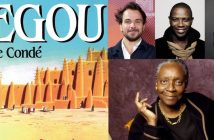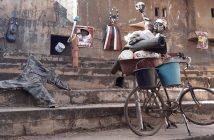Cinema ?
How did I come to cinema ?
As youngsters, we used to make a screen out of a white cloth and put it in the middle of the house.
We lit a candle and put it behind the screen where people would sit on both sides.
We cut out pictures to make characters, and the horses would make the sound « turerunturenkungkungkung. »
We made this into a story and it became our film.
Then we went to the western school. But it came to a point when I realized that this school was not for me. I thought back to the pictures that I used to make when I was younger.
The idea came and left, came and left.
Yet it never stopped.
In the middle of the school term, I thought: « No, this is not for me, this is not my way.
Getting diplomas won’t be productive for me.
My future is not sitting in an office saying that I am working.
I belong in the streets, this is what is good for me. »
Fed up with school, I left all my belongings there and went to the street.
I told people that I was an actor in the theater.
But after a time, even that became too small.
There was not enough room.
At that point, I thought, maybe I need to return to those things that I used to do when I was a kid, those pictures.
Well, I got into it, yet I wasn’t really in it.
It was all just talk, just to show off.
People started saying, « He’s crazy ! Look at him, now he is saying that he is in the cinema!
Why did he leave the western school where everybody is fighting to get into but there is no space?
He left school and now he is saying he is going to do cinema!
But he has never gone anywhere!
He has never been to France, to America.
He’s crazy ! »
I followed that craziness and it lead me to my first film, Badou Boy.
Yet, I had never left Africa.
What they say about dreams: dreams that meet with daylight are dreams that are meant to happen,
and dreams still happen, even today.
That is why when young people ask me,
« pàppa, how do you make films ? »
I always want to tell them how easy it is.
The kids ask, « what do you mean easy ? »
I say, « if you want to do it, just close your eyes.
When you close your eyes, you see darkness.
It is very dark.
Now when you close your eyes tighter, you see lots of stars.
The stars that you see in the dark, well, some of them are people, some of them are horses, and some of them are crows.
You mix them all up, as if mixing cement.
While you mix them, you tell them how to come together.
You tell them where to go, when to stop, and where to fall.
That is called a scenario.
Once you finish, you name it.
Then you open your eyes.
When you open your eyes, you have a film.
That is just how easy it is.
It’s just that easy with everything else.
You put your mind to it.
You can spend the day thinking about it.
You sleep with it, and you dream about it.
When you wake up you will see its value.
That is cinema; that is cinema.
Touki Bouki, is all about darkness, the night.
Somebody is travelling.
Who is travelling ?
A bird ? A person ?
No, a hyena is travelling.
What is this Touki Bouki all about ?
Well, a hyena will wait until it is late, very late.
Until it sees a lion.
Despite the weight and strength of the lion, the hyena will follow it ; follow it, wherever it goes.
The lion keeps walking and walking until it is tired, very tired, and weak.
Now it can only rest and sleep.
It has no more strength.
It is then that I will say:
« It is my turn to reign. The reign of the hyena is now. »
What is the reign of the hyena ?
Well, this is what Touki Bouki is about.
It is about those days when we dreamed of going abroad.
We dreamed the white’s dream of making movies.
It was as if we were foreigners in our own homes here in Africa.
Foreigners because our « everything » was abroad.
It is there that you go to succeed, to make pictures.
Then when you come back, people will call you « sir ».
Then we say, « well, we need to travel. »
« But how will you go ? »
« Oh there are ships here! »
« But how much does it cost ? »
« Oh, there are ways! »
« But why are you going there ? »
« When we get there with our beauty, with our stature, with our blackness.
People will clap their hands, and say,
« Here is the king, the ruler. »
This was our dream, and in dreaming this, we forgot our own country. What a pity !
Twenty-five years later, I realized that it was not true.
I escaped from that ugly dream.
I wanted my generation and all Africans to escape from that dream too.
And build our country where we are not foreigners.
Forget those dreams of elsewhere.
Let us dream our dreams and plant our seeds here in Africa.
That is what I felt when I made Touki Bouki.
The hyena continued to follow me and follow me.
Then I said, « wait, come, the hyena is calling for another `simb.’ So let’s play another game. »
That is when I did the film Hyenas.
I returned to the people who went on the journey in Touki Bouki.
One travelled, one stayed behind.
She said she was going, he said he couldn’t leave.
She was gone away for thirty years working as a prostitute, a prostitute.
She went to Japan, she went to New York, she went to Paris.
She collected a lot of wealth. Then one day she decided to come home.
She said to the griot: « tell the man who let me go, that I’m coming back, and there will be no peace. »
Yes, in a sense there will be, since they only want money and refrigerators.
Well, they will have all they need, until they will not want any more of it, until they are sick of it.
The griot went to announce this to the people of Colobane.
They said: « tell her to come and bring what she promises. We will give her our lives, our souls, our hearts, everything. »
The woman has returned from her journey.
Some butts are going to be kicked!
What a shame !
It is as if Africa is something that can be bought.
You can buy its people, you can buy its dignity.
What a victim, what a pity.
What a pity in the face of God!
That is the reason that I made Hyenas.
What is next ?
I cannot say.
After all, I only wanted to express my love for my country.
My country is like my stomach, which is more precious than anything abroad.
Everybody has to have something to fight for.
I am fighting for Africa.
People elsewhere are fighting for their countries.
It is time to fight for Africa.
It is almost too late,
but it is never too late for beauty.
And Africa’s future ?
(what follows was told in French by Djibril Diop Mambety)
The future could be brighter if we are sufficiently cautious of the indulgence of Linguère Ramatou, she who collected the scum of the earth and brought it back to Africa to capitalize on it. If we are able to demystify wealth, the future is brilliant, the future of Africa is brilliant. The future of black people resides in its mission that goes back to the age of the pyramids and spreads far beyond. We do not cease to produce beauty. We only need be wary of the pathetic contagion of western Enlightenment, which is really not illumination at all, but simply electricity.








